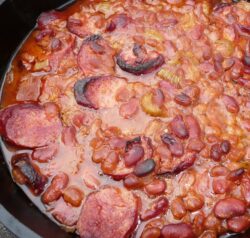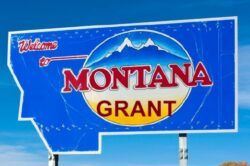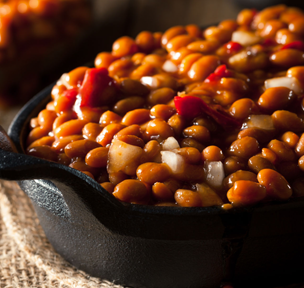 Hunters, campers, fishermen, and pioneers survived on BEANS! Boiled, baked, raw, mashed, or in soups and stews. Sacks of beans were sold with flour, sugar, bacon, and coffee. These were and still are outdoor essentials.
Hunters, campers, fishermen, and pioneers survived on BEANS! Boiled, baked, raw, mashed, or in soups and stews. Sacks of beans were sold with flour, sugar, bacon, and coffee. These were and still are outdoor essentials.
Beans made soldiers Mean during the Civil War. Both ethe Blue and Gray feasted on the brown. Beans were what was for breakfast, and dinner. Mixed with salt pork, they kept the armies on the move. The old hard biscuits, hardtack, could be crumbled and added into the bean pot. You could probably hear the army on the move!
Army of the Potomac baked beans were a favorite. These beans were simply soaked, baked, and sweetened. The slow cooking, in a Dutch Oven made them the best. Dried beans were first boiled, to soften. They then added cut op salt pork chunks into the mix along with molasses, brown sugar, and salt. The longer and slower the beans cooked, the better.
Most camp cooks today have their own twist on what makes great baked beans. Some prefer pintos, Navy, or a mix of several beans. I have found that canned beans are a good place to begin. Much of the work is already done, and the cook just needs to Kick it up a notch.
There are many bean brands to begin with. I enjoy the Bush’s brand. Place a couple large, 16 oc., cans into the Dutch Oven after you have browned up some additional onions, peppers, and cut up bacon. Sausage links also work well. Once browned, add the canned beans. Spice things up a bit with some Worcestershire sauce, onions, celery, a dash of Tabasco, and maybe your favorite BBQ sauce. You can add just about anything to the mix. Make the beans your own.
Simmer the beans long and slowly. When the camp crew returns, the beans are ready. It may be a rule that everyone needs to eat some beans. Legumes tend to create a gaseous response. Each camper may need to fight back.
“Beans, beans, good for the heart…”
Montana Grant





